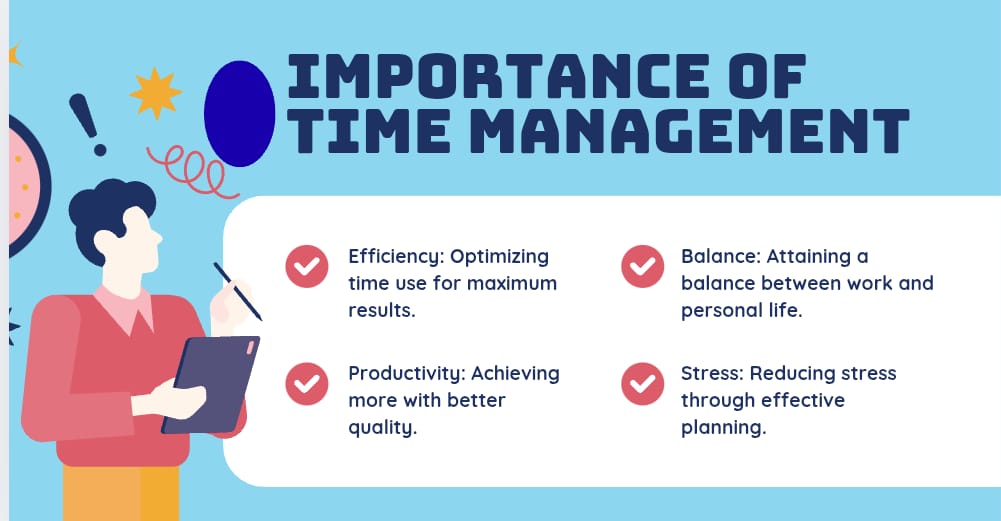Introduction
We all know how valuable time is, and we should never waste it. Every minute of our life should be used effectively, whether it is for studying, working, or anything else. We must not waste our time because once it’s gone, we cannot get it back. If you are working, especially in a remote job, time management becomes the most important factor for you. In remote work, you are your own supervisor, and everything depends on you, so it’s crucial to take care of your time and ensure that no deadlines are missed.
This article will help you understand how to manage your time effectively so that you can perform your remote work efficiently and show your true value to the company.
Read a short summary of this article here.

Why is Time Management Important in Remote Jobs?
Remote Jobs have become popular in today’s time because they provide flexibility and comfort. The advantages of a remote job feel attractive, but on the other hand, the biggest challenge of a remote job is self-discipline and time management. There is a fixed routine and direct supervision in an office environment, but in remote work, you have to manage time and tasks on your own. If you do not follow effective time management, then these distractions, procrastination, and stress can decrease your productivity easily.
Why is time management important for remote workers?
Boost productivity
When you plan, schedule, and work accordingly, then there is less chance of unnecessary time waste. You focus only on important tasks and you can see more output in less time.
Meeting deadlines
You have to take your own responsibility in a remote job. You can complete your work with proper time management, which reduces stress.
Work-life balance
The boundaries blur between work and personal life in remote work. Sometimes you work late at night, sometimes there is a family interruption in between. You can define clear work hours with time management, while maintaining personal and professional life.
Decreases stress and burnout
Pressure can increase when you do not have a clear plan for a task. But you can decrease your stress and complete your work on time with an organized routine, which can be possible with good time management.
Shows professionalism and reliability
Employees always prefer those who are disciplined and self-managed. When you use your time effectively, you become reliable and trusted by the employer. It is also strong for long-term career growth.
Long-term sustainability
If you do remote work without planning, then it can feel slightly manageable at first, but later you realize that it causes burnout, health issues, and loss of motivation. You can make a healthy and sustainable work pattern with time management through which you can perform consistently.
Overall, time management is the backbone for a remote worker. It keeps you safe from distraction, increases your productivity, and maintains a balanced lifestyle.
Common Time Management Challenges for Remote Workers
Remote work gives flexibility and comfort, but on the other hand, it is associated with some challenges that disturb the activity and work-life balance. There are more distractions in the house environment, and maintaining a structured routine is difficult in that environment. This is the main reason why remote workers are not able to utilize their time effectively. Let’s understand some common time management challenges in detail that remote workers face.
Procrastination
A common problem at the time of remote work is delay. When you are away from the office environment, taking rest increases. Remote workers keep pushing long tasks because of their comfort zone and stress increases at the time of the deadline.
Lack of routine
There is a structured routine in the office, such as the time of going to the office, having lunch, and returning home. But this boundary gets blurred in remote work. Sometimes they wake up late in the morning, sometimes work late at night, and miss lunch most of the time. That’s why work and personal life becomes difficult to manage.
Overworking
The hidden challenge of remote work is overworking. Because the house becomes an office, people do not follow the exact ‘log-out time’. Many times, remote workers check email at night or work on weekends as well. It increases stress, burnout, and health issues.
Difficulty in prioritizing
Remote workers have multiple responsibilities at a time, such as team meetings, emails, project work, and personal tasks. When remote workers do not set a priority, they spend most of their time on an unimportant task and miss an important deadline.
Distractions at home
The biggest problem is the distraction of the home at the time of remote work, such as the noise of the TV, notifications on the phone, household chores, and sometimes family or roommate interruptions. Every small distraction can break focus and making concentration again is slightly tough.
Communication gap
Communication can happen easily in the office. But remote workers have to rely mostly on chat or calls. Misunderstanding can increase if there’s a lack of clarity. Communication also gets delayed because of the different time zones of team members, and it leads to a waste of time.
These challenges are common, but understanding them and applying a solution is the first step of effective time management.
Time Management Tips for Remote Workers
1. Set Clear Work Hours for Time Management
The biggest challenge of remote work is the overlap of personal and professional time. If you haven’t fixed your working hours, then you will work late at night, and may miss meals or check your email every time. It decreases productivity and increases burnout. That’s why you should define your work hours, such as 9:00 a.m. to 5:00 p.m., and stick to them. It creates discipline, increases focus, and maintains work-life balance.
2. Create a Dedicated Workplace
Working on the sofa and on the bed can feel comfortable at first, but it decreases productivity. Create a different workplace which gives your brain a signal that now work mode is on. Keep this chair set up, the workplace should be clutter-free and organized, and all important things should be near. Add some lightening plants or motivational quotes because they increase focus and energy.
3. Prioritize Tasks with a To-Do List for Time Management
Remote workers have multiple responsibilities, and they can miss important tasks without a plan. Create a to-do list daily and rank tasks according to importance. Use the Eisenhower Matrix and the top 3 priorities method. Finish high-value tasks in the morning and do small tasks such as emails afterward. And mark tick one by one when you complete the task because it increases motivation.
4. Use the Time Blocking Technique for Time Management
Time blocking is a smart method in which you divide your day into blocks. For example, deep work at 9 to 11 a.m., 2 to 3 p.m. for a meeting. Use Google Calendar or color coding because it makes it simple. If you make this habit then you will automatically reduce distractions and boost productivity.
5. Leverage Productivity Tools
The right tools make remote work very easy. Tools like Asana, Trello, and ClickUp are best for project management. Use Slack or Microsoft Teams for communication and use Google Drive or Notion to organize docs. Use trackers like Clockify or Toggl for accountability. These tools help to reduce manual effort and keep you on track.
6. Avoid Multitasking
You can feel that multitasking is productive, but it actually decreases productivity by 40%. Mistakes increase when you split your attention, and it also reduces speed. For example, replying to an email at the time of the meeting. To avoid this, you should follow single-tasking or use batching. It keeps your brain sharp and work done with high quality.
7. Schedule Breaks to Recharge
Remote workers sometimes forget to take a break. But taking a break is not a waste of time, instead it is work like a booster for productivity. 5-minute stretch after 1 hour or 15-minute walk after every 2 hours. It keeps the body and mind fresh and increases focus.
8. Established Boundaries with Family and Friends
The biggest issue with work from home is interaction. Family and friends feel that you are always free. Set your clear boundaries, tell your work hour and request not to disturb you in between. Effective ways are to close your door, put on headphones, or put up a ” do not disturb ” sign. Your focus and professionalism both increase when people respect these.
9. Minimize Distraction
Distractions are common at the time of remote work, such as notifications, household chores, and the noise of the TV. Every small distraction can break your concentration. Identify your biggest distractions and control them to avoid this problem. Off your notification, use website blockers, and do household chores after work hours. 10 minutes of uninterrupted work is more valuable than 1 hour of interrupted work.
10. Practice the Pomodoro Technique Time Management
Pomodoro is a famous method in which you work for 25 minutes and take 5-minute breaks. Take a long break of 15 to 30 minutes after 4 Pomodoro. It keeps the brain fresh and makes long tasks manageable. Pomodoro apps and timers are easily available for this. This technique is especially perfect for work like writing, coding, or designing.
11. Communicate Your Availability
A communication gap can slow down productivity in remote teams. That’s why communicate your availability clearly. Use shared calendars or update status on Slack/Teams, such as available, in a meeting, or focus mode. The team will be aware that when you are free and when you are busy, they will avoid interruptions. This habit is very important for smooth collaboration.
Conclusion
Time management is the backbone of successful remote work. It allows you to stay focused, complete tasks efficiently, and meet deadlines without unnecessary stress. With proper planning and discipline, remote workers can maintain a healthy work-life balance, avoid burnout, and make the most of the flexibility that remote jobs offer. Moreover, mastering time management builds reliability and professionalism, helping you grow in your career while staying productive and motivated every day.
For such blogs, you can visit Best Job Tool platform.



